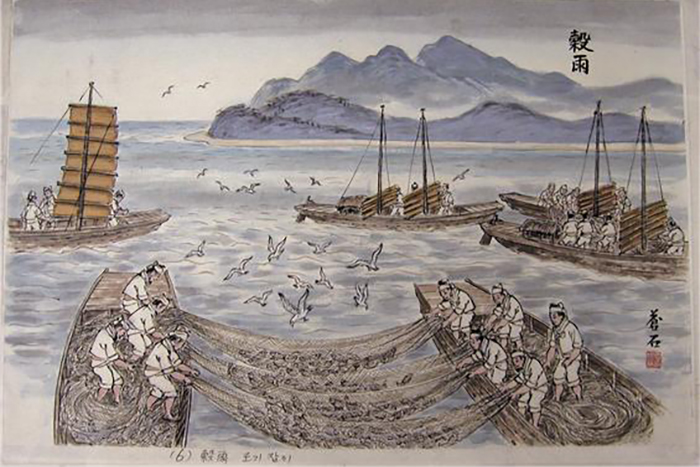Gogu (곡우, 穀雨) -- literally "Grain Rain" Day -- falls on Wednesday, April 20, this year. It marks the beginning of the sixth of the year's 24 solar terms, and it falls between the spring equinox (March 20) and the summer solstice (June 20).
Gogu is the day when, traditionally, spring rains would begin to bring growth to the agricultural crops. On this day in the past, farming households would prepare the rice seedlings and proceed with any other activities needed to start the farming season.
There are many popular sayings associated with Gogu and farming: "All the crops wake up on Gogu," "Expect a drought if the weather was dry on Gogu," and, "A rainy Gogu is not good for the crops."

On the day of Gogu, farmers would place the rice seedlings in a large ceramic jar filled with water. This allows the seeds to expand and to moisten before being planted in the paddies. The straw sacks where the seeds were stored during the winter would traditionally then be covered with pine branches.
Also on this day, if people had attended a funeral, witnessed an inauspicious event or fallen victim to bad luck, they had to cleanse themselves of evil influences before entering their home. This was done by hopping over a bonfire set for this purpose outside the home's front gate.
Even after the purification ritual, these members of the household weren't allowed to look at or to touch the rice seedlings, as this was believed to delay germination and negatively affect the year’s crop.
Source: National Folk Museum of Korea, Encyclopedia of Korean Folk Culture
By Gregory C. Eaves
Korea.net Staff Writer
Photos: Encyclopedia of Korean Folk Culture
gceaves@korea.kr
Gogu is the day when, traditionally, spring rains would begin to bring growth to the agricultural crops. On this day in the past, farming households would prepare the rice seedlings and proceed with any other activities needed to start the farming season.
There are many popular sayings associated with Gogu and farming: "All the crops wake up on Gogu," "Expect a drought if the weather was dry on Gogu," and, "A rainy Gogu is not good for the crops."

The day of Gogu marks the official beginning of farming and fishing activity in rural communities.
On the day of Gogu, farmers would place the rice seedlings in a large ceramic jar filled with water. This allows the seeds to expand and to moisten before being planted in the paddies. The straw sacks where the seeds were stored during the winter would traditionally then be covered with pine branches.
Also on this day, if people had attended a funeral, witnessed an inauspicious event or fallen victim to bad luck, they had to cleanse themselves of evil influences before entering their home. This was done by hopping over a bonfire set for this purpose outside the home's front gate.
Even after the purification ritual, these members of the household weren't allowed to look at or to touch the rice seedlings, as this was believed to delay germination and negatively affect the year’s crop.
Source: National Folk Museum of Korea, Encyclopedia of Korean Folk Culture
By Gregory C. Eaves
Korea.net Staff Writer
Photos: Encyclopedia of Korean Folk Culture
gceaves@korea.kr